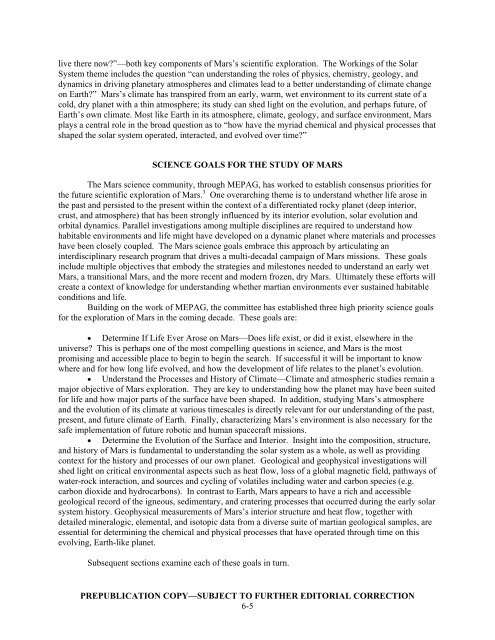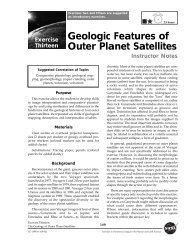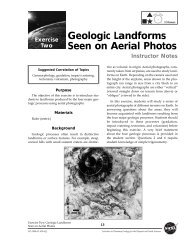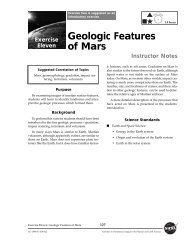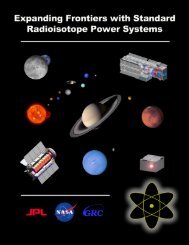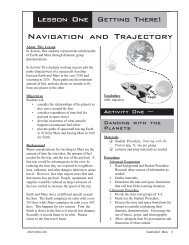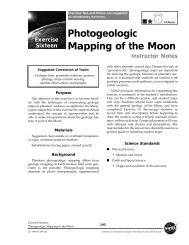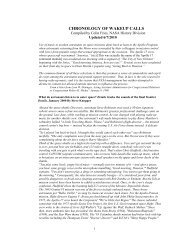Vision and Voyages for Planetary Science in the - Solar System ...
Vision and Voyages for Planetary Science in the - Solar System ...
Vision and Voyages for Planetary Science in the - Solar System ...
You also want an ePaper? Increase the reach of your titles
YUMPU automatically turns print PDFs into web optimized ePapers that Google loves.
live <strong>the</strong>re now?”—both key components of Mars’s scientific exploration. The Work<strong>in</strong>gs of <strong>the</strong> <strong>Solar</strong><br />
<strong>System</strong> <strong>the</strong>me <strong>in</strong>cludes <strong>the</strong> question “can underst<strong>and</strong><strong>in</strong>g <strong>the</strong> roles of physics, chemistry, geology, <strong>and</strong><br />
dynamics <strong>in</strong> driv<strong>in</strong>g planetary atmospheres <strong>and</strong> climates lead to a better underst<strong>and</strong><strong>in</strong>g of climate change<br />
on Earth?” Mars’s climate has transpired from an early, warm, wet environment to its current state of a<br />
cold, dry planet with a th<strong>in</strong> atmosphere; its study can shed light on <strong>the</strong> evolution, <strong>and</strong> perhaps future, of<br />
Earth’s own climate. Most like Earth <strong>in</strong> its atmosphere, climate, geology, <strong>and</strong> surface environment, Mars<br />
plays a central role <strong>in</strong> <strong>the</strong> broad question as to “how have <strong>the</strong> myriad chemical <strong>and</strong> physical processes that<br />
shaped <strong>the</strong> solar system operated, <strong>in</strong>teracted, <strong>and</strong> evolved over time?”<br />
SCIENCE GOALS FOR THE STUDY OF MARS<br />
The Mars science community, through MEPAG, has worked to establish consensus priorities <strong>for</strong><br />
<strong>the</strong> future scientific exploration of Mars. 3 One overarch<strong>in</strong>g <strong>the</strong>me is to underst<strong>and</strong> whe<strong>the</strong>r life arose <strong>in</strong><br />
<strong>the</strong> past <strong>and</strong> persisted to <strong>the</strong> present with<strong>in</strong> <strong>the</strong> context of a differentiated rocky planet (deep <strong>in</strong>terior,<br />
crust, <strong>and</strong> atmosphere) that has been strongly <strong>in</strong>fluenced by its <strong>in</strong>terior evolution, solar evolution <strong>and</strong><br />
orbital dynamics. Parallel <strong>in</strong>vestigations among multiple discipl<strong>in</strong>es are required to underst<strong>and</strong> how<br />
habitable environments <strong>and</strong> life might have developed on a dynamic planet where materials <strong>and</strong> processes<br />
have been closely coupled. The Mars science goals embrace this approach by articulat<strong>in</strong>g an<br />
<strong>in</strong>terdiscipl<strong>in</strong>ary research program that drives a multi-decadal campaign of Mars missions. These goals<br />
<strong>in</strong>clude multiple objectives that embody <strong>the</strong> strategies <strong>and</strong> milestones needed to underst<strong>and</strong> an early wet<br />
Mars, a transitional Mars, <strong>and</strong> <strong>the</strong> more recent <strong>and</strong> modern frozen, dry Mars. Ultimately <strong>the</strong>se ef<strong>for</strong>ts will<br />
create a context of knowledge <strong>for</strong> underst<strong>and</strong><strong>in</strong>g whe<strong>the</strong>r martian environments ever susta<strong>in</strong>ed habitable<br />
conditions <strong>and</strong> life.<br />
Build<strong>in</strong>g on <strong>the</strong> work of MEPAG, <strong>the</strong> committee has established three high priority science goals<br />
<strong>for</strong> <strong>the</strong> exploration of Mars <strong>in</strong> <strong>the</strong> com<strong>in</strong>g decade. These goals are:<br />
• Determ<strong>in</strong>e If Life Ever Arose on Mars—Does life exist, or did it exist, elsewhere <strong>in</strong> <strong>the</strong><br />
universe? This is perhaps one of <strong>the</strong> most compell<strong>in</strong>g questions <strong>in</strong> science, <strong>and</strong> Mars is <strong>the</strong> most<br />
promis<strong>in</strong>g <strong>and</strong> accessible place to beg<strong>in</strong> to beg<strong>in</strong> <strong>the</strong> search. If successful it will be important to know<br />
where <strong>and</strong> <strong>for</strong> how long life evolved, <strong>and</strong> how <strong>the</strong> development of life relates to <strong>the</strong> planet’s evolution.<br />
• Underst<strong>and</strong> <strong>the</strong> Processes <strong>and</strong> History of Climate—Climate <strong>and</strong> atmospheric studies rema<strong>in</strong> a<br />
major objective of Mars exploration. They are key to underst<strong>and</strong><strong>in</strong>g how <strong>the</strong> planet may have been suited<br />
<strong>for</strong> life <strong>and</strong> how major parts of <strong>the</strong> surface have been shaped. In addition, study<strong>in</strong>g Mars’s atmosphere<br />
<strong>and</strong> <strong>the</strong> evolution of its climate at various timescales is directly relevant <strong>for</strong> our underst<strong>and</strong><strong>in</strong>g of <strong>the</strong> past,<br />
present, <strong>and</strong> future climate of Earth. F<strong>in</strong>ally, characteriz<strong>in</strong>g Mars’s environment is also necessary <strong>for</strong> <strong>the</strong><br />
safe implementation of future robotic <strong>and</strong> human spacecraft missions.<br />
• Determ<strong>in</strong>e <strong>the</strong> Evolution of <strong>the</strong> Surface <strong>and</strong> Interior. Insight <strong>in</strong>to <strong>the</strong> composition, structure,<br />
<strong>and</strong> history of Mars is fundamental to underst<strong>and</strong><strong>in</strong>g <strong>the</strong> solar system as a whole, as well as provid<strong>in</strong>g<br />
context <strong>for</strong> <strong>the</strong> history <strong>and</strong> processes of our own planet. Geological <strong>and</strong> geophysical <strong>in</strong>vestigations will<br />
shed light on critical environmental aspects such as heat flow, loss of a global magnetic field, pathways of<br />
water-rock <strong>in</strong>teraction, <strong>and</strong> sources <strong>and</strong> cycl<strong>in</strong>g of volatiles <strong>in</strong>clud<strong>in</strong>g water <strong>and</strong> carbon species (e.g.<br />
carbon dioxide <strong>and</strong> hydrocarbons). In contrast to Earth, Mars appears to have a rich <strong>and</strong> accessible<br />
geological record of <strong>the</strong> igneous, sedimentary, <strong>and</strong> crater<strong>in</strong>g processes that occurred dur<strong>in</strong>g <strong>the</strong> early solar<br />
system history. Geophysical measurements of Mars’s <strong>in</strong>terior structure <strong>and</strong> heat flow, toge<strong>the</strong>r with<br />
detailed m<strong>in</strong>eralogic, elemental, <strong>and</strong> isotopic data from a diverse suite of martian geological samples, are<br />
essential <strong>for</strong> determ<strong>in</strong><strong>in</strong>g <strong>the</strong> chemical <strong>and</strong> physical processes that have operated through time on this<br />
evolv<strong>in</strong>g, Earth-like planet.<br />
Subsequent sections exam<strong>in</strong>e each of <strong>the</strong>se goals <strong>in</strong> turn.<br />
PREPUBLICATION COPY—SUBJECT TO FURTHER EDITORIAL CORRECTION<br />
6-5


